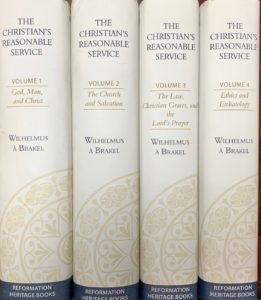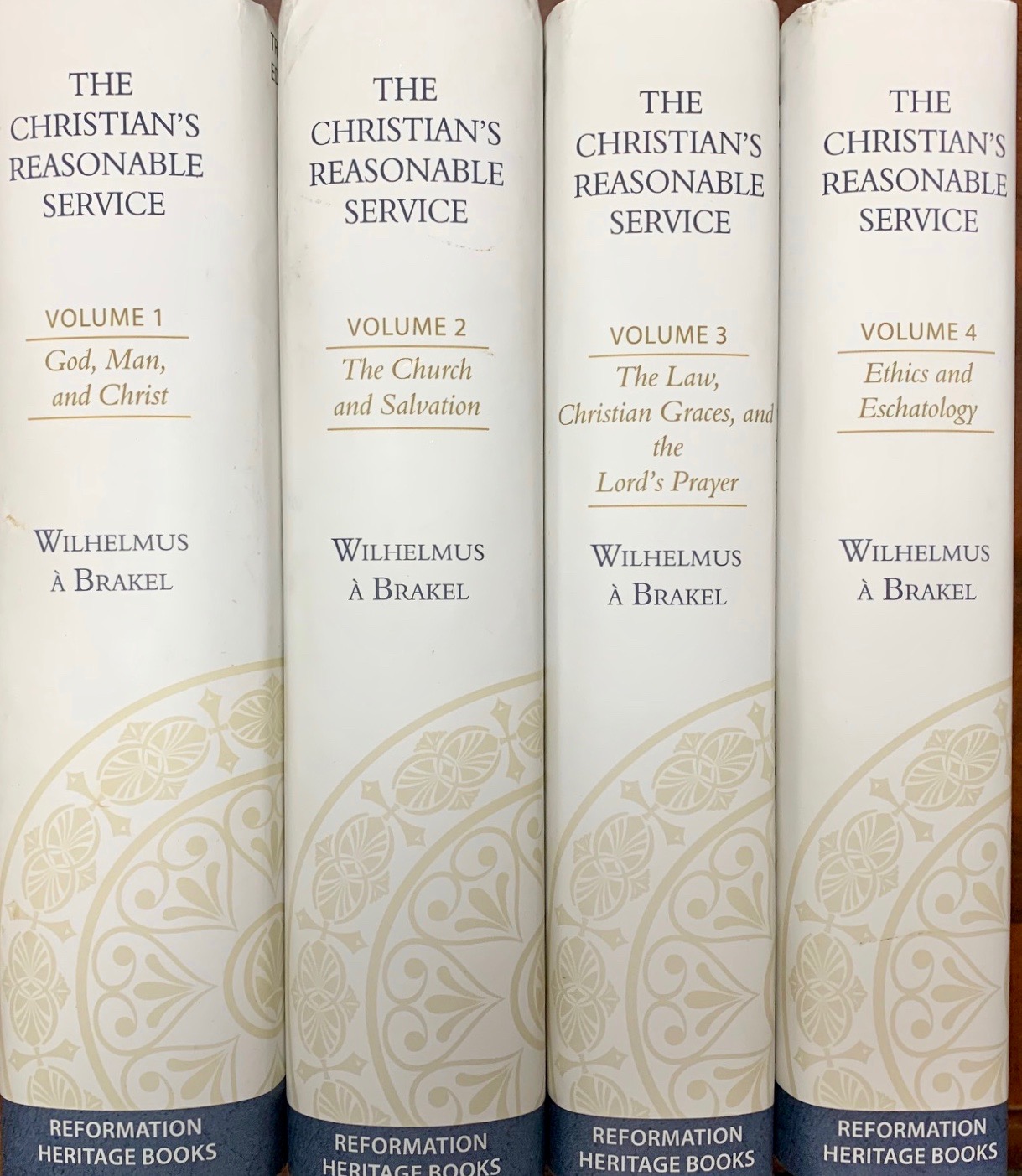
When I finish a book, I add it to my annual “books read” list. My 2019 list is at the end of this post.
I don’t have a detailed reading plan – I select books based on interest and recommendations, as well as a desire to improve my cultural awareness. I also use commentaries, Bible dictionaries, and systematic theologies as I prepare two weekly sermons and lectures. Since I seldom read these cover-to-cover, few are found in my lists.
2019 Reading Highlights
What follows are some of my 2019 reading highlights. Several of my comments come from booknotes I wrote earlier in the year.
Every year, I read a few substantial volumes in theology. This year I chose Wilhelmus à Brakel’s The Christian’s Reasonable Service (4 volumes). Although all Christians would profit from reading this masterpiece, seminarians and pastors will especially benefit from the author’s example of clear declaration of biblical doctrine and the application of it to the lives of believers. Many pastors find application to be the most difficult aspect of sermon preparation. Chapter after chapter à Brakel demonstrates application at its finest.
I am an avid biography reader; this year, two stood out.
Members from three Yazoo City churches met at our home to read Peter Brown’s Augustine of Hippo: A Biography. Although this was my third time through the book, it was the most special. There is nothing like reading a book together with good friends.
Winston Churchill tops most lists of the twentieth century’s greatest leaders. It’s inconceivable that Britain would have resisted the German onslaught without him. Andrew Roberts’s Churchill: Walking with Destiny is a comprehensive but fast-paced biography. Soldier, journalist, historian, politician, orator, war leader, and statesman, Churchill possessed the all too rare combination of physical and moral courage. Over the course of his long life, he made many missteps and errors of judgment. These could not be avoided, something Churchill knew well. “I should have made nothing if I had not made mistakes.”
Albert N. Martin’s The Man of God: His Calling and Godly Life is required reading for my first year students. On full display is the author’s pastoral wisdom, obtained through a long and fruitful ministry – 46 years of which were spent as pastor of Trinity Baptist Church in Montville, New Jersey.
In Working: Researching, Interviewing, Writing, biographer and journalist Robert A. Caro reveals how he became interested in writing, and describes his work habits and his approach to research and interviews. Caro’s primary interest is political power – why it is coveted, how it is attained and exercised, and the effect that power has on the governed, especially the powerless. He shares many fascinating anecdotes from the lives of his subjects.
God’s Ambassadors demonstrates the value that the Westminster Assembly placed upon preaching and its efforts to reform England’s preachers. With admirable succinctness, Chad Van Dixhoorn introduces the Westminster Assembly’s characters, debates, and documents on the critical area of preaching and preachers. Reformation of the pulpit then and now is not primarily an individual pursuit. Instead, it is the coordinated work of the church through its various courts. Those longing for reformation of today’s pulpit will do well to read this book with care.
Michael A.G. Haykin’s The Missionary Fellowship of William Carey offers a concise and inspirational account of the life and work of William Carey, English missionary to India and often called “The Father of Modern Missions.” Carey said of himself, “I am a plodder, it is true. I have no genius, but I can plod.” And so he did. He overcame obstacles of procrastinating Christians who errantly applied the doctrines of grace and undercut missionary resolve. He persevered in the midst of painful family trials. He stayed the course through many years of preaching and Bible translation in dangerous outposts of the Lord’s kingdom. But as critical as plodding is, it takes more than individual initiative to undertake ambitious works like Carey’s missionary voyage to India. Supportive friends and networks were absolutely necessary to Carey’s fruitful ministry; they are just as needed today.
One of my goals at RTS Jackson is to introduce students to the neglected voices of the evangelical church. I am not the best qualified to remedy this neglect, but have made it my habit to assign readings that will help. One such book is Thabiti Anyabwile’s The Faithful Preacher: Recapturing the Vision of Three Pioneering African-American Pastors. The book presents biographical sketches of Lemuel Haynes, Daniel Payne, and Francis Grimké, along with selected writings. Haynes, Payne, and Grimké were wholly committed to an educated gospel ministry, one that requires ministers to be vigilant over their morals and manners.
In Discovering the Joy of a Clear Conscience, Christopher Ash proves himself a skilled physician of the soul. Aiming straight to the heart, he asks: “If you die today and have some time for final words, will you be able to say, ‘I have nothing bad on my conscience; I can face whatever comes after death with confidence and not fear, because I know my conscience is clear?’” His book is an attempt – to my mind successful – to help believers answer yes.
Winston Churchill observed, “We shape our buildings and afterwards our buildings shape us.” The same is true of technology. In The Christian and Technology (forthcoming 2020), John Fesko explains how our technological advancements have shaped Christian thinking and behavior, for better and for worse. From screens to social media to automobiles and other technologies, he shows the blessings they offer and also the grave dangers they pose.
Annually, I read several novels. Through the years, good novels and short stories have helped me understand the human heart – my heart – better. Contemporary novels also reveal trends within the culture that God has called me to serve.
For entertainment, I made room for a few spy novels, a genre I have enjoyed since high school.
2019 Books Read
-
Lewis Allen, The Preacher’s Catechism
-
Christopher Ash, Discovering the Joy of a Clear Conscience
-
Ann Patchett, State of Wonder
-
Gene Dattel, Reckoning with Race: America’s Failure
-
David and Shirley Donovan, Counting the Cost: Kidnapped in the Niger Delta
-
Joanne J. Jung, The Lost Discipline of Conversation: Surprising Lessons in Spiritual Formation Drawn from the English Puritans
-
Winston Groom, The Allies: Roosevelt, Churchill, Stalin, and the Unlikely Alliance that Won World War II
-
Timothy Keller, Preaching: Communicating Faith in an Age of Skepticism
-
J.C. Ryle, Holiness
-
Albert N. Martin, The Man of God: His Calling and Godly Life
-
David Murray, Reset: Living a Grace-Paced Life in a Burnout Culture
-
Nicholas Carr, The Shallows: What the Internet Is Doing to Our Brains
-
John Bunyan, The Pilgrim’s Progress (part one)
-
Gail Honeyman, Eleanor Oliphant Is Completely Fine
-
Martyn Lloyd-Jones, Preachers and Preaching
-
Michael A. G. Haykin, The Missionary Fellowship of William Carey
-
Charles Bridges,The Christian Ministry with An Inquiry into the Causes of Its Inefficiency
-
James M. McPherson, Embattled Rebel: Jefferson Davis and the Confederate Civil War
-
David W. Saxton, God’s Battle Plan for the Mind: The Puritan Practice of Biblical Meditation
-
Thabiti M. Anyabwile, The Faithful Preacher: Recapturing the Vision of Three Pioneering African-American Pastors
-
Annette Dumbach and Jud Newborn, Sophie Scholl and the White Rose
-
Edith Wharton, The Age of Innocence
-
Megan Hill, A Place to Belong: Learning to Love the Local Church
-
Chad Van Dixhoorn, God’s Ambassadors: The Westminster Assembly and the Reformation of the English Pulpit, 1643-1653
-
Wilhelmus à Brakel, The Christian’s Reasonable Service (vol. 4): Ethics and Eschatology
-
Tom Wolfe, A Man in Full
-
Bob Spitz, Reagan: An American Journey
-
Elmore Leonard, 10 Rules of Writing (illustrated by Joe Ciardiello)
-
John Williams, Stoner
-
Tony Reinke, 12 Ways Your Phone is Changing You
-
Geraldine Brooks, Year of Wonders
-
John V. Fesko, Reforming Apologetics: Retrieving the Classic Reformed Approach to Defending the Faith
-
Joel R. Beeke, Reformed Preaching: Proclaiming God’s Word from the Heart of the Preacher to the Heart of His People
-
Jason Helopolous, The New Pastor’s Handbook: Help and Encouragement for the First Years of Ministry
-
Noah Rothman, Unjust: Social Justice and the Unmaking of America
-
W. H. Brands, Heirs of the Founders: The Epic Rivalry of Henry Clay, John Calhoun and Daniel Webster, the Second Generation of American Giants
-
Mollie Hemingway & Carrie Severino, Justice on Trial: The Kavanaugh Confirmation and the Future of the Supreme Court
-
Wilhelmus à Brakel, The Christian’s Reasonable Service (vol. 3): The Law, Christian Graces, and the Lord’s Prayer
-
Daniel Silva, The New Girl
-
John V. Fesko, The Christian and Technology
-
Michael A. Milton, The Secret Life of a Pastor (and other intimate letters on ministry)
-
Robert A. Caro, Working: Researching, Interviewing, Writing
-
Erik Larson, Isaac’s Storm: A Man, a Time, and the Deadliest Hurricane in History
-
Willie Morris, Yazoo: Integration in a Deep-Southern Town
-
R. Albert Mohler Jr., The Apostles’ Creed
-
J.I. Packer, Affirming the Apostles’ Creed
-
R.C. Sproul, What We Believe: Understanding and Confessing the Apostles’ Creed
-
Stephen King, On Writing: A Memoir of the Craft
-
Frederick Forsyth, The Fox
-
Islay Burns, The Pastor Of Kilsyth: The Life and Times of W.H. Burns
-
Wilhelmus à Brakel, The Christian’s Reasonable Service (vol. 2): The Church and Salvation
-
Grant McCracken, Big Hair: A Journey into the Transformation of Self
-
Cara Wall, The Dearly Beloved
-
Henry Chadwick, Augustine of Hippo: A Life
-
C.L. Chase, Vintage Yahweh: Help in Interpreting and Preaching Old Testament Narratives from a Master Scholar and Preacher
-
Daniel R. Hyde, God in Our Midst: The Tabernacle & Our Relationship with God
-
J. Stephen Yuille, A Labor of Love: Puritan Pastoral Priorities
-
George Herbert, The Country Parson: His Character and Rule of Holy Life
-
Peter Brown, Augustine of Hippo: A Biography
-
Wilhelmus à Brakel, The Christian’s Reasonable Service (vol. 1): God, Man and Christ
-
Andrew Roberts, Churchill: Walking with Destiny
-
John Perritt, Technology
-
David Allen and Brandon Hall, The Getting Things Done Workbook
-
Margaret MacMillan, Paris 1919: Six Months That Changed the World
-
Joel R. Beeke and Stephen G. Myers, Reformed Piety: Covenantal and Experiential
-
Christopher Yuan, Holy Sexuality and the Gospel: Sex, Desire, and Relationships Shaped by God’s Grand Story
-
Brian Croft & Jim Savastio, The Pastor’s Soul: The Call and Care of an Undershepherd
-
Delia Owens, Where the Crawdads Sing
-
The Bible
-
Robin DiAngelo, White Fragility: Why It’s So Hard for White People to Talk About Racism
-
Charles Krauthammer, The Point of It All: A Lifetime of Great Loves and Endeavors
-
Michael Hyatt, Your World-Class Assistant: Hiring, Training, and Leveraging an Executive Assistant
-
Jim Mattis and Bing West, Call Sign Chaos: Learning to Lead
- Mez McConnell, The Creaking on the Stairs: Finding Faith in God Through Childhood Abuse
- Andrew Roberts, Leadership in War: Essential Lessons from Those Who Made History
